Roderic “Rod” Antone
Lucy Peros | All photos courtesy Rod Antone
The majority of the Sakadas who came from the Philippines to work in the sugarcane and pineapple plantations were from the Ilocos regions (northern part of the Philippines—Luzon). In the early years, Sakadas also came from the south, from the Visayas and Mindanao. One of these earlier Sakadas was Paterno S. Pencerga, the grandfather of our January 2020 featured Sakada Offspring, Roderic (Rod) Antone.
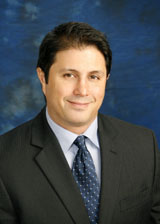
Rod was born in August 1972 at the Maui Memorial Hospital. He is presently the Executive Director of the Maui Hotel and Lodging Association. He has two children, Rylen Antone (14) and Jaiden Pickford (stepson, 19). He is the son of Cyrilla and Felix Pascual. His biological father is Wayne Antone (deceased).
Rod grew up in Kokomo (Portuguese side) and Pā‘ia (Filipino side). He mentioned that he jumped around a lot in grade school, from Doris Todd Elementary to Makawao School, Pā‘ia School, Christ The King School, St. Anthony School and finally graduated from Maui High. He studied at the University of Boulder, Colorado and graduated in 1994 with a Bachelor’s in Broadcast News.
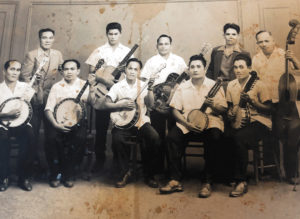
After college, Rod moved to O‘ahu with his first job reporting at KHON TV. He covered criminal and civil court cases in federal and state court as well as any significant appellate and/or high court rulings. After a few years, he moved to KHNL TV, now known as Hawai‘i News Now. Then he switched from TV news to print news and worked as a reporter at the Honolulu Star Bulletin, now known as the Star Advertiser. He covered police beat and union/labor stories. He also served as on-air talent for the live KITV nightly News tease.
After working with the Star Advertiser, Rod got married, had kids and moved to the mainland where he worked as a reporter in Washington state with the Yakima Herald-Republic in charge of the law enforcement beat, covering police and the courts. After that, he switched to government communications when his family moved to New Mexico. He developed media campaigns for the New Mexico Regulation and Licensing Department’s controversial new computer system. He also improved the perception of energy companies in Colorado and New Mexico by building better relationships with the media and focusing on positive benefits to the surrounding communities. Rod was also an on-call freelance writer for People Magazine. Rod was a Deputy Press Secretary in charge of arranging press conferences with local New Mexico media, wrote and distributed press releases, served as a spokesman for campaigns and developed and administered crisis management plans. He was also hired by one of the top international political consulting firms to coordinate the European Union campaign efforts between Budapest, Hungary and the home office in New York of AJF & Associates.
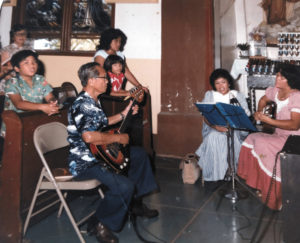
In 2010, Rod returned home to Maui and he was hired by Mayor Alan Arakawa as County Communications Director from 2011–2018. Afterwards, he worked as a consultant and briefly as the Editorial Manager for Pacific Media Group, helping to manage the MauiNow.com and the BigIslandNow.com websites.
In October 2019, Rod was selected as the Executive Director of the Maui Hotel & Lodging Association (MHLA). MHLA is a non-profit organization which represents its members by informing them about current events, keeping track of important legislation, contributing to the welfare of the community and preserving the Aloha spirit and local culture, upon which the visitor industry was built upon
Rod is very involved in the community. He started a grassroots organization called the Pā‘ia Community Action Committee (PCAC) to push for the County to create a park that would link Baldwin Park and Lower Pā‘ia Park using the undeveloped County land located between the two parks.
Rod was an emcee for several Miss and Mrs. Filipina pageants both on Maui and Honolulu. His family are very active members of Holy Rosary Church in Pā‘ia and Rod even served as an altar boy during his youth.
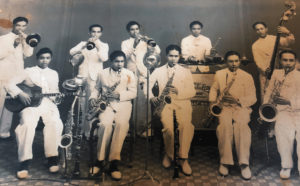
Rod received several awards: 1st Place, Society of Professional Journalist, Spot News, Print; 1st Place, Society of Professional Journalists, Feature Writing, Print; and 1st Place, Hawai‘i Publishers Association, Pa‘i Award, Breaking News, Broadcast.
Rod shared these heartwarming memories about his grandpa Paterno Pencerga as he remembered. He said he used to call his grandpa “Poppi,” who retired as a foreman at the Pā‘ia Mill. Poppi was an accomplished musician. He played the mandolin, piano, and saxophone. He played in the “Starlight Orchestra” and wore a white tuxedo. He also played with a less formal band called “The Happy Visayans.” His grandma Ramona and his Aunt Dorothy used to sing with The Happy Visayans.
Rod’s grandma Ramona was very gracious in sharing her husband’s story and their love story to this writer before she went to her heavenly reward.
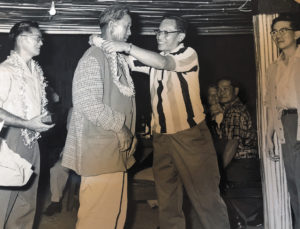
Paterno Pencerga was born in Calape, Bohol, Visayas, Philippines on November 12, 1912. He left the Philippines with his cousin, Jose Serondo on February 13, 1930 from Manila. Both Paterno and Jose did not get seasick on their boat ride. They believed that eating homemade chocolate candies made by Paterno’s mother that they brought along saved them. It also saved others to whom they shared the chocolates with.
Upon arrival on the Big Island of Hawai‘i, Paterno and Jose worked at the sugar plantation in Pāpa‘ikou, Hawai‘i. They did not like working there because it was too wet, too rainy so they moved to Maui. They worked for the Maui Agriculture Company which later became known as Hawaiian Commercial & Sugar Company (HC&S). Paterno lived in Pūlehu Camp which was located below Pukalani today. Nearby were the Makule Kailua Camp and the Keāhua Camp. At Maui Agriculture Company, he worked as an irrigator as well as other jobs like cutting grass. His daily wage was less than one dollar per day.
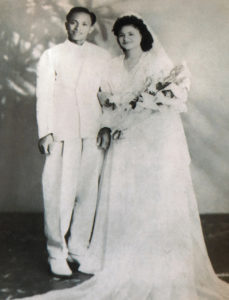
When Maui Agriculture became HC&S, Paterno moved to Orpheum Camp in Pā‘ia. He worked at the Pā‘ia Mill as a machinist and then as a Crew Chief until 1977 when he retired. He also worked at the Pā‘ia Hospital as a ward nurse’s aide from 1943 to 1946. The Pā‘ia Hospital was also called the Pā‘ia Orphanage in the 1960’s. Orpheum Camp was a very interesting place to live in at that time. There were no indoor toilets so the villagers used an outhouse. They had a furo (for a hot water bath) heated with burning wood that was supplied by the Company. They cooked their food on a kerosene stove with free kerosene supplied also by the Company. They were allowed to slaughter animals in their backyard which they shared with each other. Dried bacalao fish (cod fish) were plentiful and a very popular food for the Sakadas. They considered it as a delicacy and a treat.
Weddings, baptisms, and birthdays were celebrated quite often at the Camp’s clubhouses. Food for these parties were not catered like today but cooked by the men. Sometimes the prep time and cooking time took a couple of days. Some close friends of Paterno who also lived in Orpheum Camp were the late Eufemio and Balbino Pias, Vicente Javier, Jacinto Timario, and Alfredo and Domingo Arrocena.
One day, young and handsome Paterno spotted a beautiful young lady who was walking from the library. He couldn’t help but ask his friend Balbino Pias who she was. He found out she was from Kāheka Camp and her name was Ramona Cagasan. Ramona was from a big traditional Filipino family. Since then Paterno visited Ramona at her home, sometimes unannounced. After so many visits, their love life blossomed. Dating to watch a movie at the Pā‘ia Theater was a family affair because they were not allowed to go by themselves. They continued to court secretly and romantically. Paterno and Ramona would send letters to each other via Patricio Sensano’s shoes. Patricio worked with Paterno at the mill. He would give Ramona’s letters to Paterno at the mill and vice versa. In 1945, Paterno and Ramona agreed to get married. The wedding arrangement was also done the traditional Filipino way where the elders from each side would sit and talk about the wedding preparations. This was called danon in Ilokano. They were married at Holy Rosary Catholic Church on July 8, 1945 with a grand reception at Ramona’s parents’ house in Kāheka Camp. The famous Molina Brothers Band played the music at their wedding.
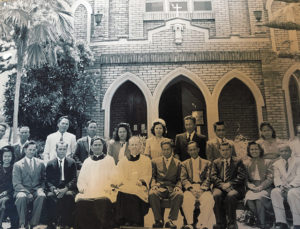
Ramona and Paterno were blessed with four children. Their eldest child is Paterno “Pete” Pencerga, Jr. He is married to Teresita Pencerga. They have two children, Suzette and Peter. Their second child is Evelyn Pencerga. Their third child is Cyrilla Pascual. She is married to Felix Pascual. They have two children, Rod and Richard Antone. Their fourth child is Juliette Rodrigues. She is married to Colin Rodrigues. They have four children, Jody and Jaimie Ribao, Kyle and Kurt Rodrigues.
Paterno was a very talented musician as mentioned by his grandson Rod Antone. He was also a member of the Islanders Band with the late Pascual Buen and Filbert Secretario. They played music at many parties at the different clubhouses on Maui. Paterno also played at the Coconut Grove in Lahaina. He was often asked by the Molina Brothers to play bass for them. Unfortunately, Paterno passed away on August 28, 2002.
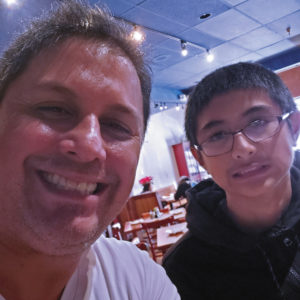
Two of Paterno’s children, Pete Pencerga and Cyrilla Pascual shared these heart-warming memories about their Dad: “Dad helped us kids make kites using meat wrapping paper and using soft cooked rice as paste or glue. He was a fun loving, easy going, hardworking and patient man. He took time to listen to us. He never laid a hand on us but we knew by his certain look when he was angry. We children always looked forward to seeing him when he came home from work. Although he had limited education, he was able to help us with Math homework. He helped Mom with the household chores. He had a vegetable garden. He was also a good storyteller especially Filipino Folk Tales. He always stressed the value of education. We miss him very much.”
“I wish I had something profound to tell our young people,” said Rod Antone. “All I can do is try and distill how my grandfather lived his life each and every day: He loved his family, fed anyone who came to his home and treated them like family as well, believed in education and hard work but also music and laughter. When he died in the early 2000s our little Holy Rosary Church was overflowing like it was Easter or Christmas mass. I recall a friend of his coming in late on a walker and begging us to open up the coffin so he could look upon my grandfather one more time and say goodbye. I’ll always remember that.”
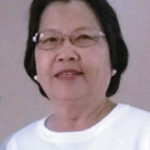 Lucy Peros is a retired school teacher, having taught at St. Anthony Grade School and Waihe‘e Elementary School. Both of her parents, Elpidio Cachero Cabalo (a 1946 Sakada) and Alejandra Cabudoy Cabalo of Hāli‘imaile worked for Maui Land and Pine Company. Lucy now enjoys retirement and has time to join other seniors in the Enhance Fitness Program under the Department of Aging three times a week. She also attends the line dancing class and other activities at Kaunoa and joins other Waihe‘e School retirees when help is needed at the school. Lucy also devotes some of her time to activities at Christ The King Catholic Church. She enjoys writing and reading in her spare time.
Lucy Peros is a retired school teacher, having taught at St. Anthony Grade School and Waihe‘e Elementary School. Both of her parents, Elpidio Cachero Cabalo (a 1946 Sakada) and Alejandra Cabudoy Cabalo of Hāli‘imaile worked for Maui Land and Pine Company. Lucy now enjoys retirement and has time to join other seniors in the Enhance Fitness Program under the Department of Aging three times a week. She also attends the line dancing class and other activities at Kaunoa and joins other Waihe‘e School retirees when help is needed at the school. Lucy also devotes some of her time to activities at Christ The King Catholic Church. She enjoys writing and reading in her spare time.
